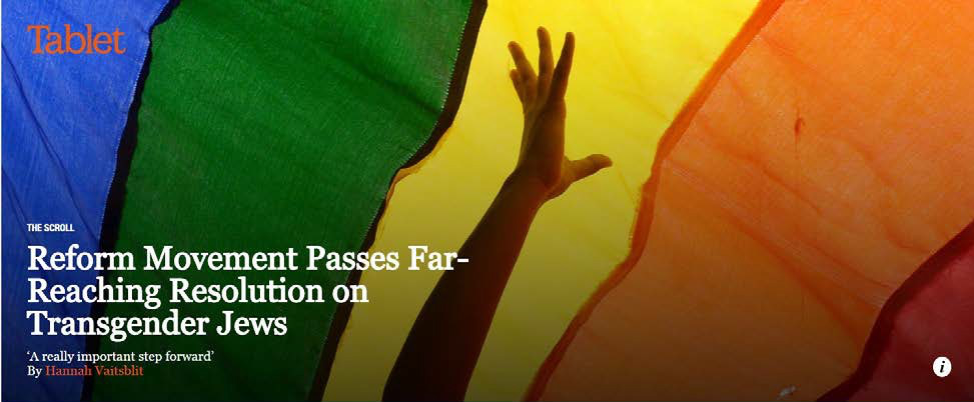
On Thursday, the Union for Reform Judaism (URJ) unanimously approved the Resolution on the Rights of Transgender and Gender Non-comforming People at its Biennial meeting in Orlando, FL. The declaration follows a history of URJ support for minorities, women, and the gay and lesbian community, including a 1977 resolution that recognizes “the rights of homosexuals.” From 1987-1997, the URJ has passed six related resolutions. According to Reuters, more than 1.5 million North American Jews affiliate with the organization, which “require[s] congregations to consider all candidates for rabbinical jobs, regardless of gender identity.”
The measure also urges public policy changes to make it easier for transgende[r] persons to update passports, voter registrations and birth certificates, and to be identified with pronouns and have access to public restrooms according to their gender identity.
An introduction to the current resolution relays the ongoing legal and cultural challenges of the international transgender community, and the URJ’s past efforts to mitigate these within the Reform movement, including admitting openly transgender rabbinical students since 2003 and accommodating transgender individuals at North American Federation of Temple Youth (NFTY) and URJ summer camps.
Catherine Bell, the National Program Director for Keshet, a Jewish LGBT advocacy group that has been a long-standing partner with URJ, said that “the trans resolution is a really important step forward, and it will help to set a standard that I hope other communities will see as an open and welcome step to come andjoin.”
The Reconstructionist Movement passed a similar referendum in March, 2013. From URJ’s resolution:
- Affirms its commitment to the full equality, inclusion and acceptance of people of all gender identities and gender expressions;
- Affirms the right of transgender and gender non-conforming individuals to be referred to by their name, gender, and pronoun of preference in our congregations, camps, schools, and other Reform affiliated organizations;
- Encourages Reform congregations, congregants, clergy, camps, institutions and affiliates, including NFTY, to continue to advocate for the rights of people of all gender identities and gender expressions;
- Urges the adoption and implementation of legislation and policies that prevent discrimination based on gender identity and expression, and that require individuals to be treated equally under the law as the gender by which they identify. This includes establishing the right to change without undue burden their identification documents to reflect their gender and name and ensuring equal access to medical and social services;
- Calls on the U.S. and Canadian governments at all levels to review and revise all laws and policies to ensure full equality and protections for people of all gender identities and expressions;
- Urges Reform Movement institutions to begin or continue to work with local and national Jewish transgender, lesbian, gay and bisexual organizations to create inclusive and welcoming communities for people of all gender identities and expressions and to spread awareness and increase knowledge of issues related to gender identity and expression. These activities may include cultural competency trainings for religious school staff, the new congregational resource guide on transgender inclusion being created by the Religious Action Center, education programs on gender identity and expression, and sermons on the topic of gender identity and gender expression;
- Recommends URJ congregations and Reform Movement institutions, facilities and events ensure, to the extent feasible, the availability of gender-neutral restrooms and other physical site needs that ensure dignity and safety for transgender and gender non-conforming individuals;
- Urges Reform Movement institutions to review their use of language in prayers, forms and policies in an effort to ensure people of all gender identities and gender expressions are welcomed, included, accepted and respected. This includes developing statements of inclusion and/or non-discrimination policies pertaining to gender identity and gender expression, the use when feasible of gender-neutral language, and offering more than two gender options or eliminating the need to select a gender on forms; and
- Will work in collaboration with other Reform Movement institutions to create ritual, programmatic and educational materials that will empower such institutions to be more inclusive and welcoming of people of all gender identities and expressions.

